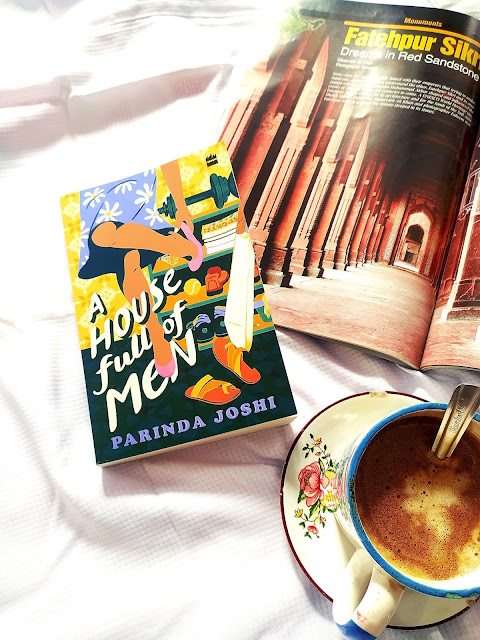A House Full of Men by Parinda Joshi
Book Review by Dhiraj Sindhi
 |
| A House Full of Men by Parinda Joshi (Cover design: Sudeepti Tucker) |
Author: Parinda Joshi
ISBN: 978-9354227011
Genre: Contemporary Fiction
Length: 357 Pages
Publication Date: 8th September 2021
Publisher: HarperCollins India
Cover Design: Sudeepti Tucker
Cover Designer: Website: platform-mag.com/ | Instagram: @sudeepti.tucker
Order your copy right now: https://amzn.to/2ZtAiwj
Parinda Joshi was born and raised in Ahmedabad and later immigrated to Los Angeles with her new husband where she navigated the challenges of starting life from scratch in an unfamiliar milieu, enriching herself with an MS in computer science, testing her limits and redefining herself. She now resides in Silicon Valley where leads growth analytics for a startup in the fashion industry, is mother to her precocious mini-me, a budding screenwriter, a lover of modern poetry, fitness enthusiast, an avid traveler and photographer and a humor junkie. She is the author of two novels, Live From London and Powerplay. She has also contributed to a short story anthology, The Turning Point: Best of Young Indian Writers, and several online publications including GQ India and The South Asian Times (New York).
 |
| Parinda Joshi |
Instagram: @parindajoshi
Twitter: @parindajoshi
Website: parindajoshi.com
Disclaimer: This review is only intended for initiating discussions. The opinions and views presented in this article are my own and do not reflect anything about the book's author.
Hooking its readers from the very first page, A House Full of Men by Parinda Joshi—a contemporary fiction novel, introduces you to its complex protagonist with a complicated past that is weighing her down with anxiety laden with overthinking, misgivings and trepidations. After the demise of her mother some 10 years ago, she takes it upon herself to fill in the void that her mother has left in the Pant household and the lives of her grandfather—‘High BP’, her father—Ravi and her twin & younger brothers—Shamik and Nishant. Maybe because of the deep-rooted patriarchal mindset, she thinks, if not her, who will? Thus, she is the only woman in a house full of men, including a male dog—Bark Twain and a frame of PG Wodehouse in her bedroom.
The novel gains tremendous pace after 100 pages of the establishment of characters and the situation as in where the protagonist stands in her life. The spirit of this book is its characters that are either highly relatable or straight out of your screens that your mind actually associates the faces of actors to these characters. My favourite character is the soul of the Pant household—Kittu’s grandfather, who is portrayed as mostly witty and sarcastic, still the wisest of all. His humour is the best from what I have read recently. The novel, for a significant part, seemed to be inspired by Bollywood and Indian Television tropes, which makes that part completely irrelevant yet funny at its best.
Kittu’s life is getting rough by day as her relationship is dying and she thinks she has got no one by her side to listen because her family members are mostly busy arguing with each other, and if not, dealing with their own issues. Kittu cares for everyone in the house but because of gender differences, no man of the house addresses or recognises her problems, be it long-persistent anxiety issues with regards to travel or her love life. This leads to Kittu closeting her feelings and emotions and out surfaces her personality that is obsessed with setting things right even if there’s nothing to fix, which makes her a complex character, a blend of pure concern and love for everyone, ambitions, a dozen troubles and unwanted thought spirals.
Considering the overall story, there are quite many adventures, moments and dialogues that I loved reading. The relationship Kittu shares with other characters in the novel is crafted cleverly to induce a sense of attachment, which readers will happily subscribe to, instantly. The climax and the end are pretty satisfying as the author manages to wrap everything up smoothly. On the other hand, there are some references and details that don’t fit the narrative. Lastly, the author has tried to address the issues of name-calling and bullying. While the author may have achieved the effect she wanted to produce, although a part of it also encourages the internalization of such practices as well as homophobia. The said passages may be intended to be a mirror to the world or to tackle the very subject, but that would be incomplete or unfair unless of course, condemned the right way.
Lastly, in A House Full of Men, I found a character with whom I could relate at many levels. Illustrious writing style along with some brilliant characters, this novel captures how holding grudges and prejudices can turn you into a different person altogether.
Happy Reading!
Thank you @vivekisms for the review copy!






No comments:
Post a Comment